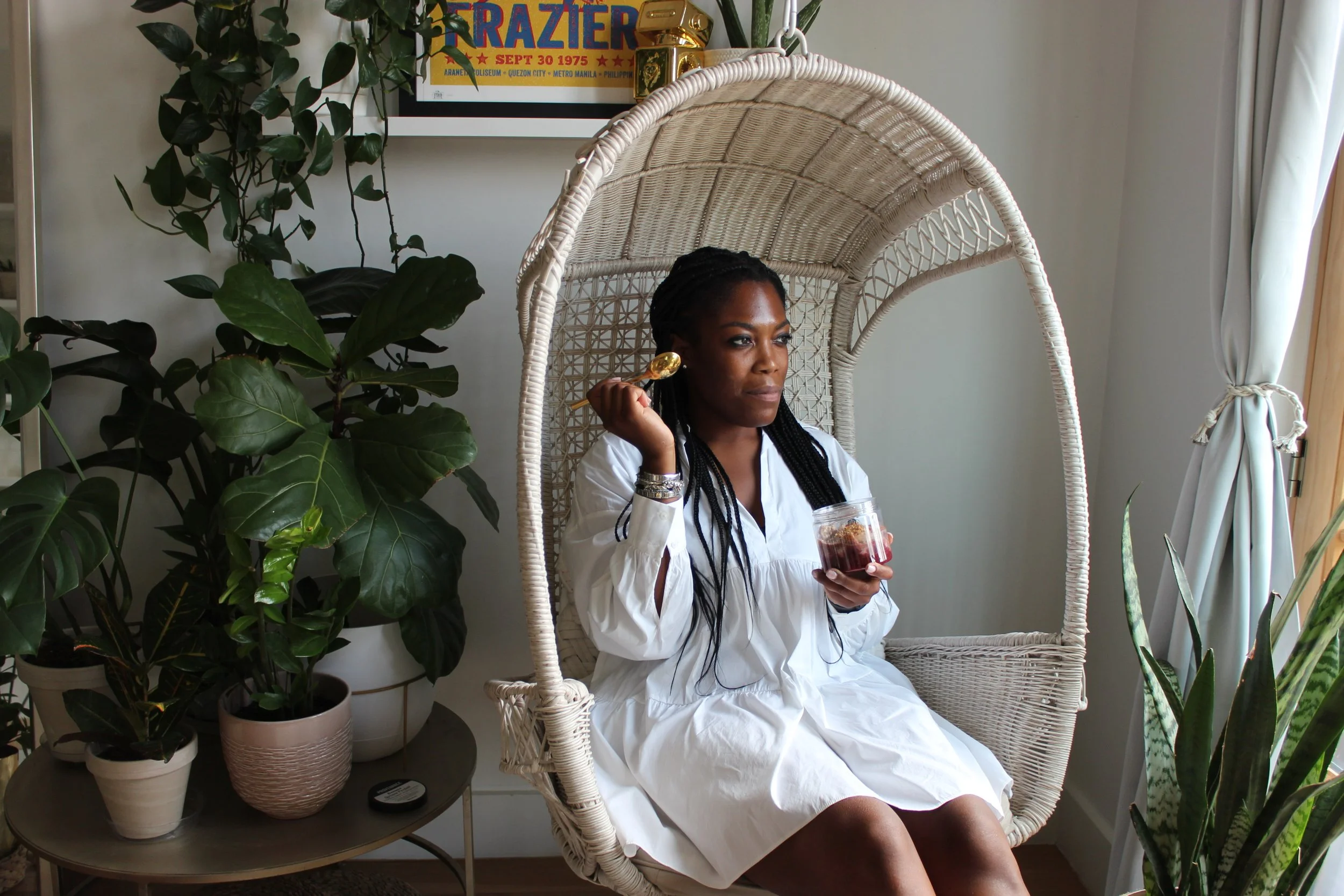I can’t remember the last time I read a book where I simply could not put it down.
As I started Kimberly Ann Johnson’s The Fourth Trimester, I realized I had come across something profound. Not only could I relate to my own experience as a new mom and all the postpartum issues in there that are “common, but not normal”, I knew there must be thousands of other women not having the conversations that need to be had to make us feel like we have not “failed” when our birth doesn’t go exactly as planned. If you believe that pregnancy and postpartum are as it’s portrayed in the media, then one day you’re adorably pregnant and about to give birth, and a couple months later you have your pre-pregnancy body back, with a sweet newborn in your arms. At your 6 week postpartum visit with your doctor, you’re told that everything is okay and given the green light to have sex. I see these images and remember how I thought it would all go before I gave birth. I was Superwoman, and I could do it all. Strong, individual, push through and persevere. These are all masculine traits that are valued in our society.
Kimberly is filling a major gap in the discussion around the postpartum period, in a way that is relatable but not scary, and progressive, honest and beautiful. It makes you believe that perhaps a divine goddess of birth and postpartum does exist, and speaks through Kimberly.
Kimberly’s own birth story begins with her 1 week past her due date in an apartment in Brazil, her husband napping and her midwife out to lunch while Kimberly labors alone. In that moment, she realizes it is her and her daughter as a motherbaby unit, one against the rest of the world with only each other to rely on. After a long and difficult labor that included tearing in her perineum, Kimberly was essentially alone in a foreign country to deal with the shock of how altered and hurt her body was without a support network to care for her. Not knowing whether it was a language or cultural issue, Kimberly knew she wasn’t “fine” as many of her health professionals there told her, and came back to the US to receive support. After working with numerous healers, she found true healing after working with Ellen Heed as a test subject in a study about postpartum scarring and emotional healing. Heed became her teacher and building upon her own experiences in yoga, sexological body work and somatic experiencing, Kimberly is now a birth doula and pospartum care expert.
I caught up with Kimberly the other day from her Encinitas, CA home to ask her questions about her journey as a healer and the positive impact that having a postpartum discussion has for women.
What first motivated you to become a healer, and why specifically with postpartum women?
My work in the world has always been a response to my biggest challenges. When my world got turned upside down as a 17 year old, I found yoga. After practicing for 6 years, I decided to become a yoga teacher (in 1999) because that felt like the most effective offering I could make- to pass on what had been such a healing balm for me. My postpartum journey was filled with so much unexpected difficulty. As I was experiencing it, I had the sense that it wasn't just a personal challenge I was having. I felt that there was something archetypal going on. When I began to heal myself and find the modalities that were right for my healing journey, I wanted to share them. I was told that I needed a full pelvic floor reconstruction. I was able to heal myself completely non-surgically. When women started to share their postpartum stories, I knew that I needed to serve them. So many women are suffering from postbirth trauma and injuries and are told that it is just "normal." I am on a mission to help women understand that they can get help. That they can heal. And that the postpartum time is something that can actually be glorious and women can emerge from it more whole, rather than what we generally see happening - women feeling isolated and lonely. The postpartum time is a unique cultural interject - a special time where values that our culture needs to become more whole are necessities. If we learn how to care for women and new families, we will be repairing an essential part of our cultural fabric.
The "fourth trimester' is a term many of us are not familiar with. Can you explain a bit further what that means and why you chose it for the title of your book?
The Fourth Trimester refers to the first three months after a woman gives birth when she and her baby are one interconnected unit. Although their physical bodies are separate, they still need each other as much as they did in the previous three trimesters. Women are bombarded with information about how to care for themselves in the first three trimesters, and then after the baby is born, all the information turns to parenting and caring for the baby. There is very little information out there on what the mother needs during this time. The Fourth Trimester is just as important, if not more important, for a woman's longterm health. Moms matter just as much as their babies do. The Fourth Trimester is a call to acknowledge how important it is for women to recover well after giving birth so that she can return to movement, exercise, intimacy and life in a respectful way.
How has the current medical system in the US not fully met women's needs postpartum?
All the current medical system has to offer is a 6 week postbirth visit. Midwives and doctors alike are focused on birth, and once the baby is out, and there is no infection, most women don't get much more care. Those 6 week visits are usually under 10 minutes and women get the "green light" for sex and exercise. However few women are feeling ready for sex or exercise or even have a clue how to approach either. Our current medical system divides us up - biomechanics are handled by physical therapists, trauma is handled by therapists, scar tissue is largely ignored (and is a huge player in postbirth recovery). Because things are so segmented, many women don't get the holistic care they need. Currently there is a movement to recognize women's mental health and postpartum depression as significant. But there is very little in place to help women avoid the circumstances that often lead to depression. To be fair, the medical system cannot be solely responsible for filling in the gaps of absence of extended family and community. However medical professionals do need a better understanding of continuity of care and how birth practices and gynecological practices contribute to how women experience the postpartum time.
I love your story about choosing the word “lazy” to describe yourself when you were pregnant in a prenatal yoga class in Brazil and how all the women celebrated you for it. Can you talk a little bit about the cultural differences between having a baby here in the US versus many of the other places you’ve lived and traveled to?
Americans are famous for having very little to no vacation time (compared to Europe and South America), famous for defining ourselves by how much we can get done, and defining ourselves by our work. Americans are also famous for our Puritanical views on the body and sex. Almost everywhere in the world, cultures recognize that the time after a woman has a baby is very important. Canada offers women 6 months to 1 year of paid leave. Sweden and Germany offer mothers and fathers a year of paid leave. Here in the US, maternity leave is categorized as disability. The postpartum time requires a huge amount of slowing down. Some cultures understand relaxing and slowing better than we do - partially because in many countries, things just aren't as efficient as they are here. So people learn how to be patient and how to roll with the unexpected - both skills that new parents need. All over the world cultures understand that the goal is not to "bounce back" as fast as possible, but to give new families time to get to know one another and truly heal. In Holland and France, women get in-home physical therapy and postural re-education for the first six weeks after birth.
You must be so busy these days, working on both coasts, promoting your new book, all while mothering your daughter! What is your go-to for self-care, and how do you find the time to fit it in?
My go-to is 10 hours of sleep per night. Sleep and friends are my salvation. I also get in some kind of movement as often as I can. I get down to the beach as much as possible.
How do you fuel your body, food-related or otherwise?
I love moving and am always trying to find more ways to move. I do a functional training workout called Fitwall. I go to yoga once a week or so, and I eat whole foods. I minimize sugar. My vice is coffee, although I had the flu recently and one of the side benefits was a coffee detox that I seem to be keeping up!
For women who are interested in learning more about you and your work, where should they start?
I am online at www.magamama.com and on Instagram @magamamas. My podcast, Magamama: Sex, Birth and Motherhood is filled with juicy conversations and information. You can read the first 30 pages of the book, as well as lots of reviews, on Amazon.
New Mom Care Package - Now Available
Becoming a new mother can be both exhilarating and exhausting, full of bliss and overwhelm. After the momentous, but physically demanding act of birth, new moms truly need support, sustenance, nourishment and love. Show your support for the expecting or new mom in your life with a special care package.Caroll Lee - Founder of Provenance Meals
Caroll is an avid cook, mother of two, Board Certified Health Counselor and the founder of Provenance Meals. Her passion in life is to feed people real food -- food that is raised, grown and prepared in traditional ways that are good for your health and good for the planet. Caroll practices holistic nutrition, understanding that a healthy diet must be combined with other sources of nourishment—loving relationships, enjoyable physical activity, meaningful work and spiritual connectedness—to reach true health and happiness.














